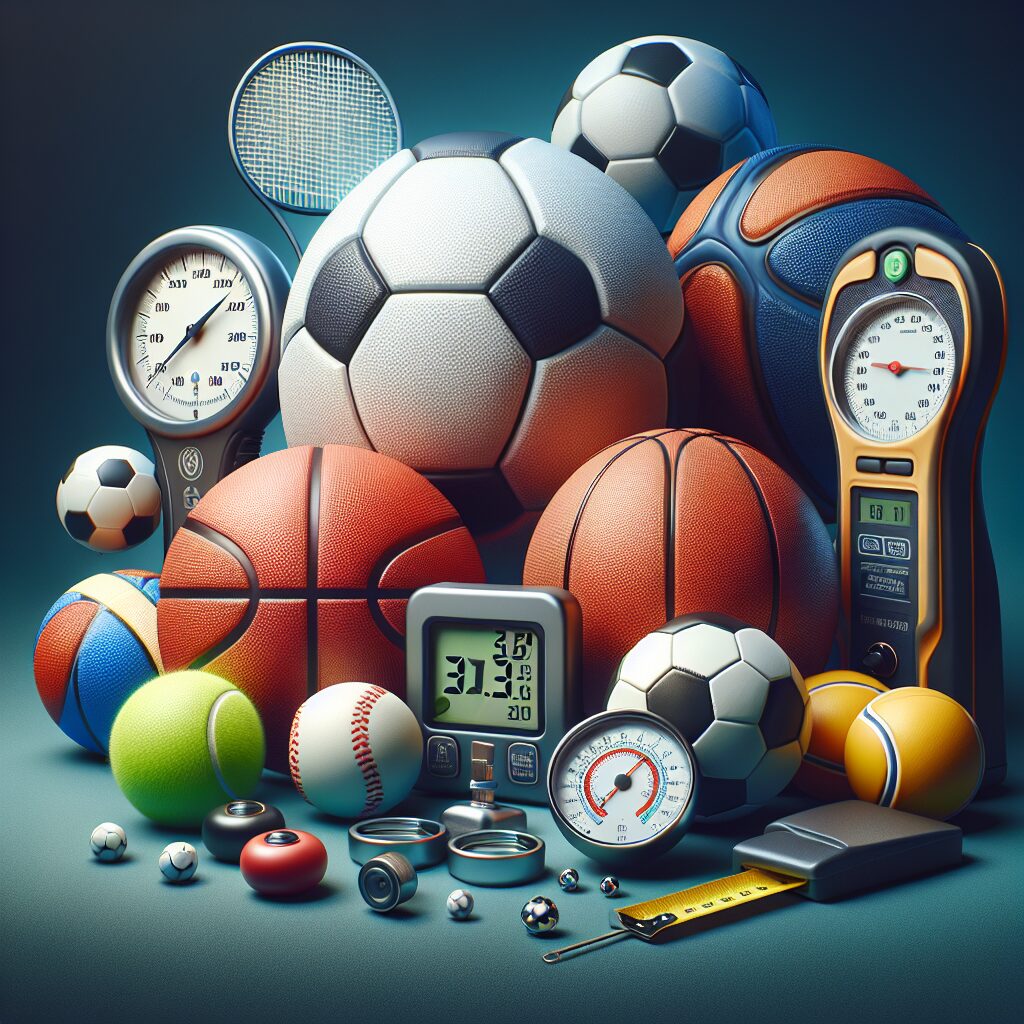Certification: A Seal of Quality for Sports Balls
Sports balls are an integral part of various athletic activities, be it football, basketball, or even golf. However, many individuals may not be aware of the rigorous testing and certification processes that these balls undergo to ensure their quality. Certification serves as a seal of approval, guaranteeing that the sports balls meet specific standards of quality, durability, and performance. This process entails a comprehensive evaluation of various factors, including the ball’s materials, construction, and compliance with regulations.
The impact of certification is significant in ensuring that sports balls are not only safe to use but also provide a consistent and fair playing experience. As sports evolve and become more competitive, it becomes crucial to have reliable and standardized equipment. Certification not only confirms the quality of the sports balls but also assures players, coaches, and referees that the equipment meets recognized industry standards. Moreover, certified sports balls enhance the credibility of the sport itself, as they contribute to fair play and consistent performance.
In the coming sections of this article, we will delve deeper into the key takeaways linked to sports ball certification. We will explore the importance of certification in maintaining the integrity of the game, highlight the specific features and tests involved in the certification process, and discuss how consumers can make informed choices when purchasing sports balls. By gaining insights into these aspects, readers will develop a better understanding of the value and necessity of certification in the world of sports balls. Stay tuned for valuable information that can help you make well-informed decisions when it comes to purchasing and using sports balls.
Key Takeaways
1. Certification ensures the quality and safety of sports balls by meeting specific standards set by governing bodies such as FIFA and NBA, guaranteeing consistent performance for athletes and consumers.
2. The certification process evaluates various aspects of sports balls, including size, weight, rebound, roundness, and durability, ensuring that they perform optimally and meet the required standards.
3. The certification mark, often found on the product or packaging, provides consumers with assurance that the sports ball they are purchasing has met specific quality standards and has undergone rigorous testing.
4. Sports equipment manufacturers must invest in research, development, and rigorous testing processes to obtain and maintain certification, demonstrating their commitment to producing high-quality products.
5. By choosing certified sports balls, consumers can trust that these products have passed through stringent quality control measures, ensuring they enjoy a better experience, improved performance, and increased safety during sports activities.
Why is Certification Important for Sports Balls?
What is Certification?
Certification serves as a seal of quality for sports balls, assuring consumers that the product they are purchasing meets specific industry standards. It involves a thorough testing process conducted by independent organizations to assess the performance, safety, and durability of the sports balls.
The Benefits of Certified Sports Balls
Certified sports balls offer a range of advantages to both athletes and consumers. Firstly, certification guarantees the quality and reliability of the product. By purchasing certified sports balls, athletes can be confident that they are using equipment that meets high-performance standards, allowing them to play at their best.
Moreover, certified sports balls ensure safety for athletes during play. The rigorous testing conducted as a part of the certification process evaluates aspects like impact resistance, bounce, and durability, reducing the risk of accidents and injuries during gameplay.
Furthermore, certified sports balls provide peace of mind for consumers. They can rely on the certification as a seal of quality, knowing that they are investing in a product that has undergone extensive testing to meet the established standards. This enhances customer satisfaction and loyalty, making them more likely to choose certified sports balls in the future.
The Certification Process
The certification of sports balls involves a meticulous testing procedure conducted by authorized bodies. These organizations assess various factors and properties of the balls to ensure they meet the required standards.
The certification process includes a series of tests such as checking the weight, circumference, and shape of the ball. Additionally, testers evaluate other factors such as the bounce, air pressure retention, water absorption, and resistance to impact and deformation. The balls are also examined for their material quality, stitching, and overall workmanship.
Recognized Certification Organizations
There are several renowned certification organizations in the sports industry that ensure the quality of sports balls. These organizations follow strict testing protocols and provide certifications that are widely recognized and respected.
Some of the well-known certification organizations for sports balls include FIFA (Fédération Internationale de Football Association) for soccer balls, FIBA (International Basketball Federation) for basketballs, and ITF (International Tennis Federation) for tennis balls. Each of these organizations has its own set of standards that the sports balls must meet to obtain certification.
Choosing Certified Sports Balls
When purchasing sports balls, it is crucial to look for the certification seal. This mark indicates that the ball has undergone rigorous testing and meets the industry standards. By choosing certified sports balls, athletes and consumers can be confident in their performance, safety, and durability.
Additionally, it is important to consider the specific certification requirements for the desired sport. Different sports have unique specifications for the size, weight, and other characteristics of the ball. Ensuring compliance with these requirements will further enhance the playing experience and avoid any potential issues during gameplay.
Frequently Asked Questions about Sports Ball Certification
1. Does certification guarantee the durability of a sports ball?
Certification involves testing for durability along with other factors. However, it is important to note that the lifespan of a sports ball can also be influenced by external factors such as usage, maintenance, and storage conditions.
2. Are certified sports balls more expensive?
Certified sports balls may have a slightly higher price compared to non-certified ones due to the additional testing and quality assurance procedures involved. However, the investment in certified sports balls is worth it considering the superior performance, safety, and overall value they offer.
3. Can sports balls without certification be trusted?
While uncertified sports balls may still be usable, they lack the assurance of meeting quality, safety, and performance standards. Opting for certified sports balls is highly recommended to ensure the best experience and peace of mind during gameplay.
4. Can a sports ball lose its certification?
If a sports ball has been modified or altered after obtaining certification, it may lose its certified status. It is important to use the ball as intended and follow any specific maintenance instructions provided by the manufacturer to retain its certification validity.
5. Is certification mandatory for all sports balls?
Certification is not mandatory for all sports balls; however, it is highly recommended. Many leagues, tournaments, and organized sports events require the use of certified balls to maintain fairness and ensure consistent performance among participants.
Frequently Asked Questions
1. What is the purpose of certification for sports balls?
Certification for sports balls serves as a seal of quality, ensuring that the ball meets specific standards and has undergone rigorous testing. It provides confidence to consumers that they are purchasing a product that will perform well and maintain its integrity.
2. Who issues the certifications for sports balls?
Certifications for sports balls are issued by reputable organizations such as FIFA (Fédération Internationale de Football Association), NBA (National Basketball Association), or the International Tennis Federation, among others, depending on the sport. These organizations have established comprehensive testing procedures to evaluate various aspects of a sports ball’s quality.
3. What factors are assessed during the certification process?
The certification process involves evaluating factors such as ball size, weight, circumference, bounce, durability, water resistance, aerodynamics, and overall performance. Each sport has specific requirements, and certified balls must meet or exceed these standards to receive the seal of quality.
4. How can I identify if a sports ball is certified?
Certified sports balls typically feature visible markings or labeling indicating the certification. These markings may include logos or stamps from the issuing organization and are often displayed on the surface of the ball or on its packaging. It is essential to check for these marks before making a purchase to ensure you are getting a quality-certified product.
5. Are certified sports balls more expensive than non-certified ones?
While certified sports balls may have a slightly higher price point compared to non-certified ones, the added assurance of quality and performance justifies the investment. Certified balls are likely to last longer, offer better playability, and adhere to the rules and regulations of the specific sport more effectively.
6. Are there different levels of certification for sports balls?
Yes, depending on the organization and sport, there may be different levels of certification. For example, FIFA offers different quality marks such as FIFA Quality Pro, which indicates the highest level of performance and is used for professional matches. It’s important to understand the distinctions between certifications to ensure you choose a ball that suits your needs.
7. Can I use non-certified sports balls for official competitions or matches?
No, official competitions and matches usually require the use of certified sports balls. Non-certified balls may not meet the required standards for fair play, and using them could result in disqualification or loss of credibility. It’s crucial to use certified balls for official purposes to maintain fairness and uphold the integrity of the sport.
8. How often do sports balls need to be recertified?
The frequency of recertification varies depending on the sport and organization. In some cases, sports balls may require recertification annually, while in others, it could be every few years. It’s advisable to check the specific guidelines and recommendations provided by the respective issuing organization to ensure continued compliance.
9. Are there any legal consequences for selling non-certified sports balls?
Selling non-certified sports balls may lead to legal consequences in certain jurisdictions. It is essential for manufacturers, retailers, and sellers to comply with the regulations related to sports ball certification to avoid potential penalties or legal trouble. Consumers should also be cautious and only purchase balls from reliable sources to ensure they are genuine certified products.
10. Can sports balls become decertified?
Yes, sports balls can be decertified if they are found to no longer meet the established standards or fail to pass the required tests during recertification. Decertification could occur due to changes in regulations, modifications in sports rules, or the discovery of flaws that compromise the ball’s performance or safety. It’s important to stay updated with the latest certifications to ensure you are using valid and authorized sports balls.
Final Thoughts
In conclusion, certification is a crucial aspect of ensuring the quality, performance, and integrity of sports balls. The extensive testing procedures conducted by reputable organizations provide consumers with confidence that certified balls meet specific standards and are suitable for official competitions or matches.
By purchasing certified sports balls, athletes, coaches, and sports enthusiasts can benefit from enhanced playability, durability, and adherence to sport-specific regulations. It is vital for both consumers and industry stakeholders to understand the significance of certification and stay vigilant in sourcing and using only certified sports balls.




